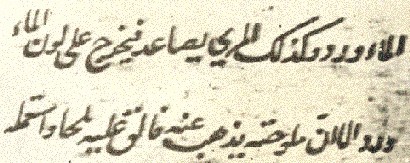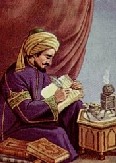|
In
every issue, Al Shidagah magazine features a review of
the life and deeds of at least one significant
historical leader from the Muslim realm. More than once,
we have presented the biographies of prominent Islamic
philosophers. Interestingly, although Muslim and
influential throughout the Arab lands, these great men
were arguably never of Arab descent. For this reason, in
the present issue of our magazine, we decided to present
to you the greatest true Arab philosopher - Al Kindi.
A
Short Biography
Ya’qub
ibn Ishaq As Sabah Al Kindi, or better known simply as
Al Kindi, has earned himself the title “The Philosopher
of the Arabs”. As mentioned above, this is due to the
fact that he was the greatest philosopher of true Arab
descent. Although some sources claim otherwise, most
agree on his family’s noble Arab origins (as opposed to
him having a Persian descent, for example). As his name
suggest, Al Kindi was a descendant of the so–called
Royal Kindah tribe which came northwards from the south
of Arabia. The Royal Kindah represented a number of
united tribes which saw the peak of their power in the 6th
century AD. Although less prominent after the arrival of
Islam, the Al Kindah managed to keep their high status
in Muslim society.
Al Kindi was born
around the year 800 in Al Kufa, present day Iraq, about
170 km south of Baghdad and 10 km northeast of Najaf. At
that time, Al Kufa was a flourishing city. The first
Arab armies to occupy the city came in 638. About a
century later, the Abbasids made Al Kufa the temporary
capital of their empire while Baghdad was being built.
This is when the town grew into a prominent cultural
center, creating the right atmosphere for, among other
things, making of the Kufic script – the earliest
alphabet of the Arabic language. It was in this
stimulating cultural setting that Al Kindi grew and
lived. He found support from the ruling caliphs Al
Mamun (813 – 833 BC) and Al Mutasim (833 – 842 BC) who
were fond of helping ambitious scholars. In his work, Al
Kindi was mainly interested in philosophical thought
from Greece, as well as a multitude of disciplines such
as medicinal treatments, astrology, mathematics, the
making of steel weapons, and others. By most accounts,
Al Kindi is mentioned as the author of 241 books on
philosophic and other subjects during his life.
Al
Kindi’s work and life - a
detailed account
Al Kindi’s father occupied a prominent
official position in the court of Haroon Al Rashid as
the governor of Al Kufa. This helped young Al Kindi get
access to sources of information and manuscripts that
were not open to the public, which allowed him to build
up his scholarly knowledge. Soon enough, Al Kindi felt
confident to move to Baghdad to take his studies to a
higher level. In Baghdad, his enthusiasm and dedication
to philosophy and the sciences elevated him in the eyes
of the learned societies. This is when the caliph Al
Mamun first heard about Al Kindi.
Coincidentally, the caliph was preparing a grand project he
called the “House of Wisdom” in Baghdad. With it, Al
Mamun envisioned to create a kind of a university where,
among other disciplines, Byzantine Greek philosophical
and other scripts were to be translated. As this
undertaking suggests, Al Mamun was very supportive of
scholarship and acquisition of knowledge. After meeting
with Al Kindi, the caliph soon appointed him to the
House of Wisdom together with such people as the great
mathematicians
Al Khwarizmi and
the
Banu Musa brothers.
In the House of Wisdom, Al
Kindi devoted a great deal of his time to the
translation of Byzantine Greek philosophical works. Some
sources dispute whether he himself was able to do the
translation. In any case, however, all accounts agree
that he was supervising the translation, acting as a
kind of general editor. In addition, Al Kindi reviewed
and wrote analyses on many Byzantine Greek philosophers.
It seems that he was most strongly inspired by the works
of the great philosopher Aristotle. His philosophical
commentaries also show borrowings from
Plato and
Proclus as well as
others upon which he built his own theories and
interpretations.
Al Kindi gladly took part in other projects of Al Mamun. One
such project that deserves mention is the grand
observatories Al Mamun built from where Al Kindi could
study the stars and compare what he saw to the Byzantine
Greek manuscripts.
When Caliph Al Mamun died in 833, his brother Al Mutasim
took over. Familiar with his work, dedication, and
honesty, caliph Al Mutasim appointed Al Kindi as the
personal coach to his son Ahmad. As tutor of Ahmad, Al
Kindi was still able to follow his scholarly pursuit in
different sciences. In chemistry, for example, contrary
to popular belief in alchemical practices, he contested
the notion that gold could be manufactured from base
metal combinations. This was a revolutionary view for
its time implying that chemical reactions cannot
possibly be used to transform one element into another.
Al Kindi was also interested in the study of physics where
was particularly fascinated in geometrical optics,
although he was influenced by current scientific trends
and confused the theory of light and the theory of
vision. Nevertheless, he was successful in formulating
the theory of parallels. He looked into the prospect of
having pairs of straight lines in a plane which are
non-parallel and non-intersecting at the same time. He
wrote several manuscripts with his findings on the
subject, which he later compiled into books.
Closely related to geometry and astronomy, the science of
mathematics was another subject that interested Al Kindi.
His findings in arithmetic and spherical geometry
resulted in four books on the subject. Al Kindi is also
credited with contributions to the Arabic system of
numerals (which for the most part was formulated by Al
Khwarizmi).
 
Al Kindi also made important contributions in medicine. His
most significant gift to the development of this science
was his systematic classification of the dosage to be
given to patients. In one of his books, he presented
precisely the correct dose for each medication used at
the time, which helped standardize the preparation of
recipes.
A keen student of arithmetic, Al-Kindi is the author of many
works on the subject. Some of these analyzed the Hindu
numerical system, the relationship of space and time
(which he asserted were finite), the accord of numerical
combinations, relative quantities, and the calculation
of proportions.
In music, Al Kindi found a scientific approach as well. His
aim was to find a logical explanation to the
peculiarities of sound arrangement. He observed how
harmony is produced by the arrangement of specific
notes. He noticed that each note carries a precise pitch
and that those notes with a very high or a very low
pitch do not fit in a harmonious manner. As a result, he
found it necessary to produce a manuscript explaining
how to establish pitch. Further, Al Kindi explained that
the overall harmony is a result of the rate of
recurrence of the notes. Perhaps most revolutionary for
its time, Al Kindi found out that we hear sounds because
of the sound waves generated. These, he observed, travel
through the air and reach our ear-drums.
In philosophy, a recurring theme in Al Kindi was his belief
that orthodox Islam is not in conflict with philosophy
as a whole. Indeed, he produced many arguments in favor
of the congruent relationship that can exist between
philosophy and Islam. However, this earned Al Kindi some
enemies in the learned societies, the
Banu Musa brothers
and the astrologer Abu Ma'shar in particular.
Another philosophical paper, which is more popular by its
Latin title “De
Intellectu”, deserves mention. In it, Al
Kindi shows influence from Aristotle in the discussion
of the two kinds of intellect. He called these “the
passive intellect, which is a receptive power, and the
active intellect, which abstracts objects that can be
known intellectually.” In the treatise, Al Kindi goes on
to explain the notion of abstraction and the origin of
universals using Aristotle, and to some extent Plato, to
build upon and justify his own findings. Thus, he
formulates the active intellect as the “intelligence;”
in other words a psychic stuff independent of the soul.
This so called “intelligence” influences the passive
intellect and in a way enables it from a dormant state
to the achievement of knowledge. Regarding the
“universals,” Al Kindi says they are the result of the
effect of the active intellect, in other words the
intelligence, upon the passive intellect.
Never tiring of scientific pursuit, Al Kindi also produced a
multitude of miscellaneous manuscripts on different
subjects ranging from his views on alchemy and precious
stones to the astronomical path that the planets follow.
Much of this labor is now lost in history. We know of it
only through referring sources, many of them in Latin,
who hint at Al Kindi’s breakthrough findings,
inventions, and observations. Although it is uncertain
how close to the originals the translations were,
scholars have been able to infer that the essence of Al
Kindi’s texts has been sustained. The total number of
books that Al Kindi wrote is believed to be 241. They
can be classified in this descending manner: 32 on
geometry, 22 on medicine, 22 on philosophy, 16 on
astronomy, 12 on physics, 11 on arithmetic, 7 on music,
5 on psychology and the rest on miscellaneous topics. Of
those translated into Latin, the main books are Al
Mosiqa, Mad-o-Jazr, Risalah Dar Tanjim, Ikhtiyarat Al
Ayyam, Ilahyat Al Aristu, and Aduiyah Muraqaba.
Al Kindi died in 873 AD. His work lived on and had a
far-reaching effect on philosophical thought and
scientific methods throughout Asia and Europe. His Latin
translations influenced many scholars in the Medieval
Europe and beyond, earning him the title “The
Philosopher of the Arabs.” |
